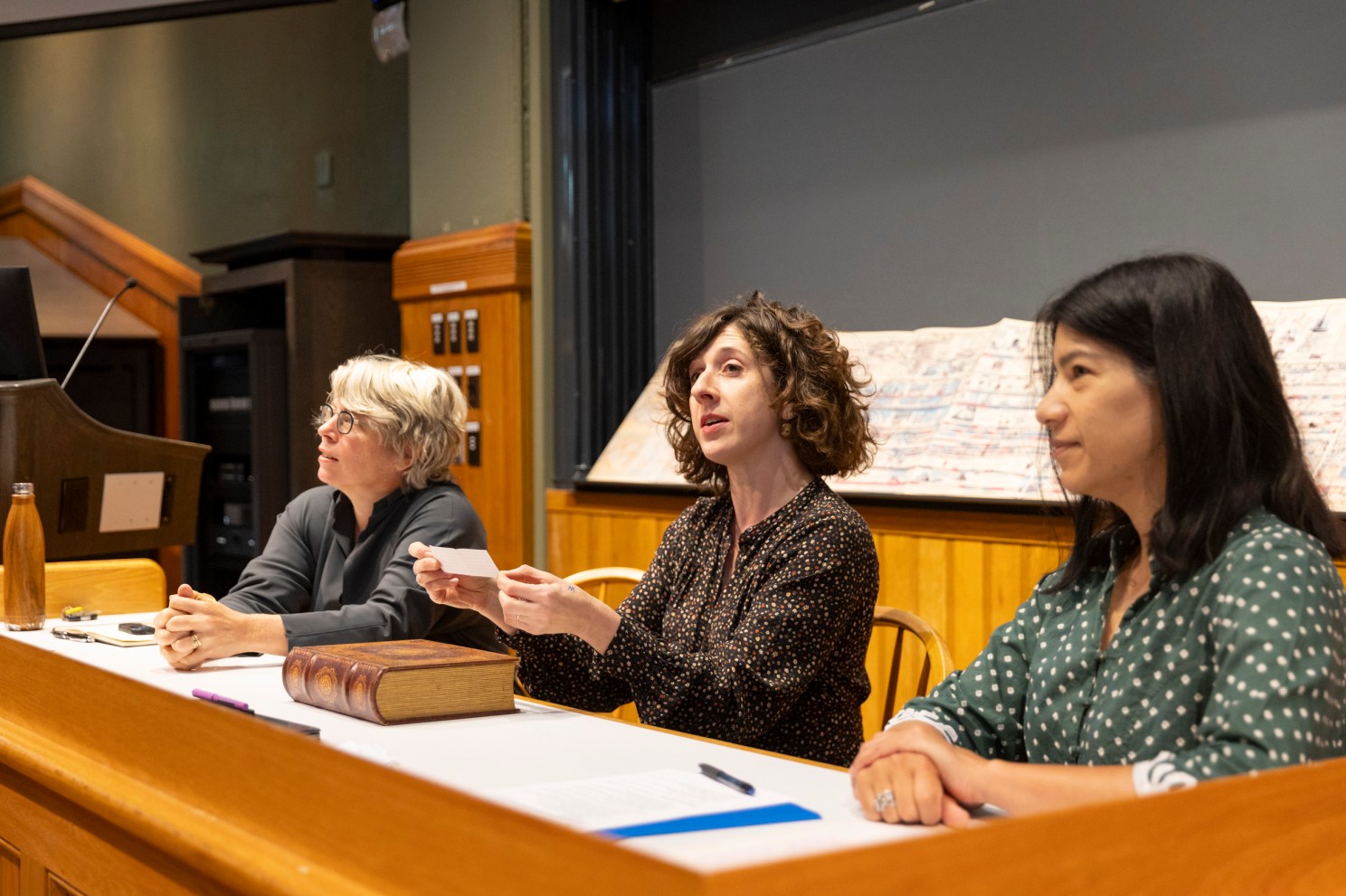
Jill Lepore (from left), Kirsten Weld, and Maya Jasanoff are teaching “HIST 10: A History of the Present.”
Niles Singer/Harvard Staff Photographer
Seeing them as current events and not really new
Jill Lepore, Maya Jasanoff, Kirsten Weld launch course that views present as wholly connected to the past
The media keep calling the 2024 election “unprecedented,” said political historian Jill Lepore. They said the same thing about contests for U.S. president in 2016 and 2020.
“Since, I would say, the [2000] Bush v. Gore election, our political discourse is about falling off a cliff,” Lepore, the David Woods Kemper ’41 Professor of American History, told her students recently. “It has a weird torquing effect on how people experience daily life.”
Lepore is one of three well-known scholars teaching the brand-new “HIST 10: A History of the Present” this semester. Co-created with professors Maya Jasanoff and Kirsten Weld, the introductory course uncovers historic concepts and clichés that anchor perceptions of today.
“We’re going to approach the present in this classroom as historians — as people concerned with how individuals and collectives situate themselves in historical time and, most importantly, how they make meaning of it,” promised Weld, a Canadian-born historian of modern Latin America.
Jasanoff, the X.D. and Nancy Yang Professor of Arts and Sciences and Coolidge Professor of History, kicked off the first lecture with some history on the course itself. HIST 10 was once offered as a yearlong survey for actual and prospective concentrators focused on the Western world, especially Europe, she explained. But that framing slowly fell out of favor with students and faculty alike until the course was finally canceled in 2006.
“But we felt, and continue to feel, that history is something we all need to be educated in and conscious of,” said Jasanoff, a historian of the British Empire. “And so the three of us started talking about re-presenting a gateway course to revivify the sense that history is integrated into our consciousness, our lives, our society, our government, and much more.”
They designed a lecture course broken into three modules, each informed by individual interests and expertise. First Jasanoff is interrogating evolving definitions of ancestry. Lepore, who is also a Harvard Law School professor and New Yorker staff writer, will then lead a section on rights. And Weld will wrap things up with a unit on memory.
“What really drew me to the class were these conceptual frameworks,” said Victoria Rengel ’28, a Newark, N.J., native considering a joint concentration in government and history. “As the professors laid out in the first class, most human conflict can be broken down and understood through one of the three.”
Enrolled in the course are about 60 undergraduates, plus a sizeable contingent of auditors. “It’s packed,” observed A.J. Moyeda ’27, a history concentrator with a secondary in philosophy from South Texas. “I never imagined a history course with this many students.”
Mondays begin with scholarly takes on the students’ anonymously submitted questions. Wednesdays feature all three professors engaged with (and often debating) daily news. The first few conversations left Jacqueline Metzger ’27, a joint concentrator in history and in Theater, Dance & Media from the Washington, D.C., area, rethinking how election coverage is packaged.
“I really liked the conversation about things being unprecedented,” Metzger said. “It’s kind of an intimidating term, because it makes you feel we’re unequipped to handle what’s going on.”
Most of Day One was focused on the news cycle — a key tool for making sense of the present. Jasanoff invited everyone to pull out their laptops for some live polling on media habits and current events. Newspapers, social media, and word of mouth/group chats emerged as the go-to sources. Topping a ranking of 2024 issues were “the election,” “political polarization,” and “Palestine.”
Picking up on one of these topics, Weld demonstrated how students might think about the war in Gaza using her module. In the Middle East and elsewhere, perspectives on the conflict are “indelibly and inseparably framed,” she said, by historical memories of two traumatic world events: the Holocaust, when 6 million Jews were killed by the Nazis, and the Nakba of 1948, when 750,000 Palestinian Arabs were displaced to create the modern State of Israel.
“How one remembers those events — both within one’s own families as well as politically speaking — makes up a constitutive building block of your interpretations of the present,” Weld said.
The 75-minute session ended with Lepore lending rich historical insight to the 21st century’s confusing swirl of fact, fiction, and information technology. She started with the “long adversarial tradition” between America’s newspapers and its political leaders, beginning in the 1720s with the dogged New England Courant (published by Benjamin Franklin’s brother James).
This year’s candidates for U.S. president are hardly the first to try reaching voters without risking criticism by newspaper reporters. Lepore offered examples that bridge past and present including rallies, political postering, and President Franklin D. Roosevelt’s direct-to-listener radio broadcasts from the 1930s.
“It’s cool to see that much of what we’re dealing with has happened again and again,” Metzger said. “It’s such a grounded way to understand who we are and where we are in history.”
At one point, Lepore shared an advertising clip from President Dwight D. Eisenhower’s 1956 re-election campaign. It opens with an animated figure anguished over the firehose of political information from TV, radio, magazines, and newspapers.
“I’ve listened to everybody,” he cries. “Who’s right? What’s right? What should I believe? What are the facts? How can I tell?”
“Those are questions we still have,” Lepore emphasized. “They’re endemic to the age of mass communication we have been in for well more than a century. I hope that gives you some comfort.”




